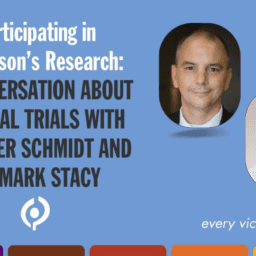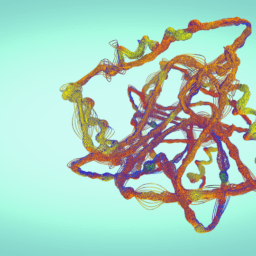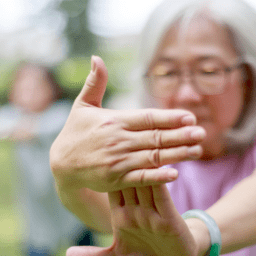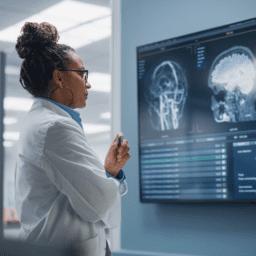As winter approaches, there is so much to look forward to. Here are some of the most important articles, podcasts, research, and living well stories that hit the news this month. Let us know if we missed anything important. Happy reading!
PARKINSON’S ARTICLES AND PODCASTS
- In the journal Bioelectronic Medicine, researchers share a proof-of-concept study about an alternate approach to alleviating Parkinson’s symptoms — spinal cord stimulation. The researchers observed that all 15 of their patients experienced “significant improvement” relating to pain and mobility after using a spinal cord stimulator device.
- In a recent study published in the journal Movement Disorders, researchers explain how a new skin test can accurately identify Parkinson’s. The team says the chemical assay can detect clumping of alpha-synuclein in skin samples, which could lead to earlier detection of Parkinson’s.
- Results of a recent study may help Parkinson’s researchers discover and develop new therapies by focusing less on neurons and protein aggregates and more on the ways excess lipids in nerve cells may cause inflammation and trigger Parkinson’s.
- Neuroscientists at MIT’s McGovern Institute for Brain Research have discovered an unexpectedly complex relationship between two types of signals (one electrical and one chemical) that are disrupted in people with Parkinson’s. The researchers believe further study and understanding of the unforeseen relationship between dopamine signaling and beta activity could lead to better treatments for people with Parkinson’s.
- New research published in the journal Nature Communications highlights how novel molecular tweezer therapy, designed to break up clusters of toxic proteins associated with Parkinson’s, can effectively slow the disease.
- Another study, published in the journal Molecular Neurodegeneration, indicates that targeting certain regions of the alpha-synuclein protein could be a viable therapeutic strategy for people with Parkinson’s. Because α-Synuclein (aSyn) aggregation is thought to play a central role in neurodegenerative disorders like Parkinson’s, researchers believe their findings provide a strong rationale for developing therapies aimed at inhibiting aSyn aggregation at membrane surfaces, including interventions that target the C-terminal domain, as a strategy to slow neurodegeneration in the brains of people with Parkinson’s and similar neurodegenerative disorders.
- Researchers at the University of Luxembourg have published a study showing an association between inflammation and specific genetic mutations in some people with Parkinson’s. The researchers discovered that people carrying mutations in the Parkin or PINK1 genes have an increased level of circulating mitochondrial DNA and interleukin 6 (IL6), indicating that deficiency in Parkin or PINK1 proteins leads to impaired mitophagy. This dysfunction, in turn, causes the release of mitochondrial DNA, which triggers inflammation and the elevation of interleukin 6 levels in the blood. When the IL6 reaches the brain, it is thought to play a role in neurodegeneration. The researchers suggest that targeting the immune system with anti-inflammatory medication holds the potential to influence the course of Parkinson’s, at least in a subset of people.
- Previous studies have linked fine particulate air pollution exposure with Alzheimer’s disease, but now researchers looking at the brainstems of children and young adults exposed to air pollution in Mexico City have found markers not only of Alzheimer’s but also of Parkinson’s and of motor neurone disease as well. The markers were coupled with the presence of nanoparticles within the brainstem whose appearance and composition indicated that they were likely to come from vehicle pollution. This has led researchers to conclude that vehicular caused air pollution, whether inhaled or swallowed, puts people at risk of potential neurological harm.
- Coffee may protect people from developing Parkinson’s even if they have genetic risk factors, according to a new study published in the journal Neurology. These results are promising and encourage future research exploring caffeine and caffeine-related therapies to lessen the chance that people with this [LRRK2] gene called develop Parkinson’s,” the study author said.
- A recent MDS Community Conversations podcast features Professor Brit Mollenhauer, a neurologist at a Parkinson’s and Movement Disorders specialty hospital in Germany, who shares the impact of COVID-19 on research and the latest on how inflammation related to COVID might trigger Parkinson’s.
- How do relationships with friends change after a Parkinson’s diagnosis? Listen to stories and advice on navigating friendships on the latest Parkinson’s and Me podcast.
PARKINSON’S THERAPIES AND MEDICATIONS
- The US Food and Drug Administration (FDA) has accepted a new drug application for mesdopetam (IRL790), an experimental therapy for reducing levodopa-induced dyskinesia in people with Parkinson’s. This move will allow for the enrollment of US patients in a planned Phase 2b/3 clinical trial, in addition to enrollments in Europe. Recruitment is expected to start by the end of the year.
- Also, in hopes of providing relief to people with levodopa-induced dyskinesia, Parmather has filed an application with the FDA requesting orphan drug designation be given to ketamine, which researchers from the University of Arizona believe can provide safe, tolerable, and potentially long-term reductions in dyskinesia, depression, and pain in people with Parkinson’s.
- A medication called ondansetron, used to treat nausea experienced by people undergoing chemotherapy, may reduce hallucinations in people with Parkinson’s. Parkinson’s UK and University College London will conduct a double-blind clinical trial over a two-year period to explore whether it is safe and effective against hallucinations, which 50% of more of people with Parkinson’s may experience.
- Data from a recent placebo-controlled study with a group of 60 people with Parkinson’s indicates that the diabetes medication exenatide may slow the progression of Parkinson’s. The researchers will soon begin a Phase 3 clinical trial to study further how exenatide may alter the course of Parkinson’s progression.
PARKINSON’S LIVING WELL STORIES
- PD Avengers, a group of Parkinson’s advocates who have been inspired by the book Ending Parkinson’s Disease (co-authored by Dr. Bastiaan Bloem, Dr. Michael Okun, Dr. Ray Dorsey, and Todd Sherer, PhD) have the goal of uniting 1,000,000 people with Parkinson’s and those who care about Parkinson’s by 2022 and taking action.
- In a recent interview with Good Housekeeping, four women with Parkinson’s share their stories and what advice they’d give to their younger selves at the time of diagnosis. “You can live a great life with Parkinson’s, but you have to accept help along the way,” one says.
- People with Parkinson’s in Kansas City, MO, recently shared how participating in a four-week art program not only improved their fine motor skills but also their moods and quality of life.
-
On November 17, join the Michael J. Fox Foundation for their virtual Research Roundtable about recent advancements and highlights in the Parkinson’s research field.
PARKINSON’S SURVEYS AND CLINICAL TRIALS
Home Based Tele-exercise Study for People with Chronic Neurological Impairments – Burke Neurological Institute
Parkinson’s and Drooling – European Parkinson’s Disease Association (EPDA)
Parkinson’s and Service Dogs – University of Groningen, Netherlands
Neurology Study Interest Registry – University of Rochester
Park Test – University of Rochester
Project Euphonia – LSVT Global and Project Euphonia
BouNDless – Phase 3 trial to investigate the efficacy, safety, and tolerability of ND0612, a continuous subcutaneous levodopa/carbidopa delivery system in comparison to oral levodopa/carbidopa in people with Parkinson’s experiencing motor fluctuations
WANT MORE PRACTICAL ARTICLES LIKE THIS?
Much more can be found in our Every Victory Counts® manual. It’s packed with up-to-date information about everything Parkinson’s, plus an expanded worksheets and resources section to help you put what you’ve learned into action. Request your free copy of the Every Victory Counts manual by clicking the button below.
Thank you to our 2020 Peak Partners, Amneal and Kyowa Kirin, with special support from Adamas, for helping us make printing, distributing, and shipping the Every Victory Counts manual possible.

















